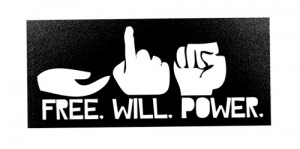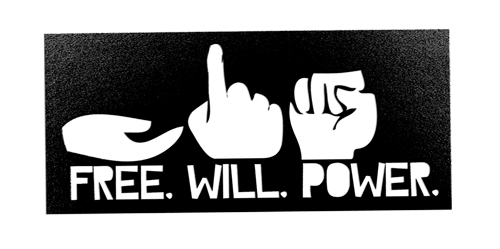As the hate-mail I receive shows, some people are very turned off by the tagline of my site which reads:
Addiction is not a disease, it is a choice.
One of the most common interpretations among the haters goes something like this: “When you call addiction a choice, you’re not offering a solution, you’re only telling people that they should just use will-power.” I’m going to state clearly now, for anyone who cares to pay attention – I am not saying that will-power is the solution.
In the same way that I wouldn’t think disease=virus in regards to addiction, I would ask those who are skeptical about my claims of addiction being a choice to not interpret that as choice=will-power. I try to understand the disease model as it’s presented within the recovery culture, and as you may see from other articles on this site, I go deep into the concepts as they’re currently understood within the treatment world. Likewise, it would be nice if you tried to understand what I’m saying on a deeper conceptual level (and you may find the results helpful). The tagline of my site is just that, a tagline, brief and meant to sum up and communicate much more than it says on the surface.
Here is how I understand will-power in the context of quitting things, and I think it’s reasonable: to exercise will-power is to actively try not to do the thing that you really want to do. That is, if will-power is your solution, you aren’t exercising your will, you are exercising denying your own will. Now, that certainly is a way to make a choice to stop abusing substances, but I certainly don’t think it’s the best way to go about things, or that effective. Lacking a miraculous life-changing epiphany, you may need to exercise some “will-power” at times, but it isn’t a great long-term strategy.
I think that 12-steppers equate the idea that addiction is a choice with the sole concept of using “will-power” because they see the will to excessively use substances as something which is fixed, determined by the “disease”, and that their main solution is to try to replace one’s one will with “the will of god”. Thus to choose to end a substance use problem in this view would naturally mean to choose to fight your will.
 I, on the other hand, believe that the will we’re talking about here is flexible, or changeable. I think it’s a product of beliefs, philosophies, values and a whole bunch of other choices. So I’d hope that you could try to understand what I’m saying on these grounds – you don’t need to fight or deny your will for the rest of your life, that would be a miserable way to live in the long run (as the popular AA concept of “white knuckling it” acknowledges). There may be times when your only option is to exercise will power, but the main thrust of following a choice model is to make proactive constructive choices – not to sit there battling your desires, trying to not do something.
I, on the other hand, believe that the will we’re talking about here is flexible, or changeable. I think it’s a product of beliefs, philosophies, values and a whole bunch of other choices. So I’d hope that you could try to understand what I’m saying on these grounds – you don’t need to fight or deny your will for the rest of your life, that would be a miserable way to live in the long run (as the popular AA concept of “white knuckling it” acknowledges). There may be times when your only option is to exercise will power, but the main thrust of following a choice model is to make proactive constructive choices – not to sit there battling your desires, trying to not do something.
When you choose to develop a new perspective on substance use,and it’s relative value to you – then you will be choosing to change your will. The less you believe you need substance use or the less you believe it has to offer you, then the less you will want to do it. This is the most important thing you can focus on – changing your will. You don’t need strength or support, or to increase “self-control” or willpower. There are other ways you may indirectly change your will too. As one chooses to focus on and direct their efforts towards developing new non-drug interests and habits, these new interests become a more important and stronger part of your “will” than the desire to excessively use substances. When you choose to honestly evaluate what’s important to you in your life (i.e. your values), and you choose to develop goals that play to your personal values, and you choose to practice investing time and effort into pursuits with delayed (but higher amounts of) gratification rather than pursuits with instant (and fleeting) gratification, these choices and efforts eventually change your will into something that is more productive and leads you towards greater satisfaction with life. Basically, addiction is created and reinforced by a certain world of choices/chosen beliefs (characterized by magical thinking about the powers of drugs/alcohol to serve your psychological/emotional needs; short-sightedness / mindless whim worship; and low self-esteem about your ability to carry out better choices); likewise, addiction is ended by a certain world of choices focused on competing motivations/values, and longer-term investment in one’s own well-being, delayed gratification, true self-interest, and long-term success, and a belief in personal ability to change, grow, and do things that bring you consistently greater levels of happiness.
In short, when I say addiction is a choice, I’m not saying that there’s a magic pill of will-power to solve the problem, nor that there is an instant fix. Making better choices isn’t necessarily easy either, and making a habit of new choices isn’t always a cakewalk – so that should not be assumed. I’m saying that the lifestyle is a product of choices, and that one can effectively change by making new sets of choices.

Far from a hate- email, this is my thank you email. Everything I have read on this site as well as most of what I have read in the linked information has helped my in ways I never thought possible. I was on the verge of giving in completely to the notion that I was doomed to a life as outlined in your ’10 things’ article.
“When you choose to develop a new perspective on substance use,and it’s relative value to you – then you will be choosing to change your will. ”
My will is changing, and change is good.
Thank you, Steve Slate. Sincerely.